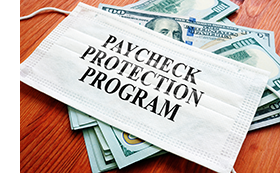For many business owners, the Paycheck Protection Program loan journey is not over when they receive acknowledgement of loan forgiveness from their local lender and from the Small Business Administration. From a tax perspective, the map that lays out the tax impact remains unclear.
During the fourth quarter of 2020, the primary question most business owners and tax professionals grappled with was whether or not the expenses paid using PPP Loan proceeds would be tax deductible and/or whether the loan proceeds were considered taxable income. The uncertainty related to these questions made tax planning for the 2020 calendar year difficult
Now in 2021, there is clarity that the loan proceeds do not represent taxable income and the expenses paid using the loan proceeds are tax deductible. However, questions related to loan forgiveness and how the transactions effect taxpayers who own their businesses through pass-through entity structures such as Subchapter S-Corporations, Limited Liability Companies and Partnerships remain unanswered.
In May 2021, the American Institute of Certified Public Accountants (AICPA) sent a letter of comment to the Internal Revenue Service regarding various tax issues related to PPP Loan forgiveness. Most of these issues involved the difference in the timing of when tax-deductible expenses were paid and when the PPP Loan is forgiven. In most cases, these transactions occurred over multiple tax years.
In addition to the timing of the transactions, another level of tax consideration applies based upon the “At-risk” rules. If an entity is being taxed as a partnership, the partners or members are not personally liable for the loan making the amount not at-risk. This status then disallows the deduction of the expenses paid using the PPP Loan proceeds.
Furthermore, many business owners used the PPP Loan proceeds as intended in 2020, which allowed them to retain other cash sources. Now that a great deal of the uncertainty related to business survival and continuity have passed, business owners are now taking distributions of their excess cash balances for personal use. The question remains whether or not these distributions will have any personal tax impact depending upon both the company’s tax basis and that of the individual owners.
The AICPA letter of comment included a request for statements from the IRS regarding the following issues:
-
Regarding the timing of recognition of debt forgiveness income and deductibility of related expenses – treating the PPP Loan debt as forgiven as the expenses are paid, and treating the application for forgiveness as merely a ministerial act, thereby negating concerns over these transactions occurring in multiple tax years.
-
Regarding the specific tax basis issues for calculating the tax basis for Subchapter S-Corporations – the expenses paid with PPP Loan proceeds to be used for debt forgiveness do not reduce the Accumulated Adjustments Account for S-corporations, thereby giving S-corporation shareholders tax basis in the debt forgiveness.
-
Regarding debt questions included on the business returns – the PPP Loan is not treated as a debt when answering the questions on the business tax return that ask if the taxpayer has had any forgiveness of indebtedness, thereby not treating the loans as debt.
For now, we are still awaiting guidance on these issues from the IRS. Uncertainty regarding these issues, once again, provides challenges in the tax planning process. Zinner & Co. will provide updates on these issues as more information becomes available from the IRS.





